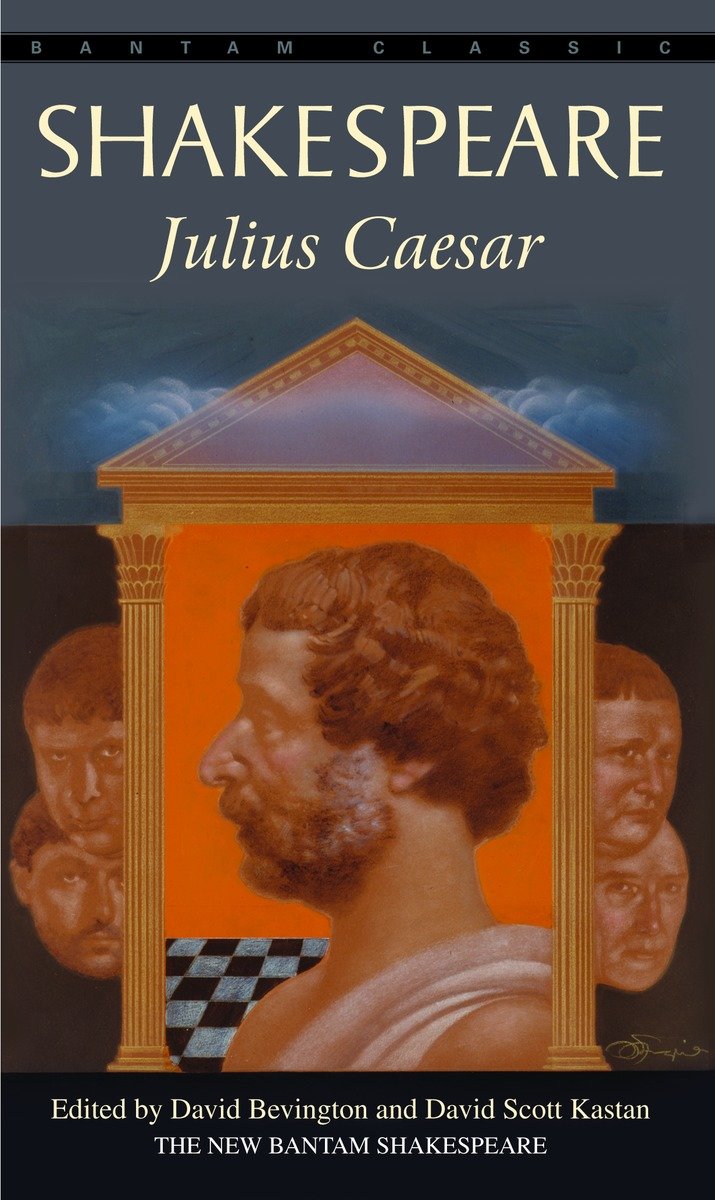Description
In this striking tragedy of political conflict, Shakespeare turns to the ancient Roman world and to the famous assassination of Julius Caesar by his republican opponents. The play is one of tumultuous rivalry, of prophetic warnings–“Beware the ides of March”–and of moving public oratory, “Friends, Romans, countrymen!” Ironies abound and most of all for Brutus, whose fate it is to learn that his idealistic motives for joining the conspiracy against a would-be dictator are not enough to sustain the movement once Caesar is dead.Each Edition Includes:• Comprehensive explanatory notes • Vivid introductions and the most up-to-date scholarship • Clear, modernized spelling and punctuation, enabling contemporary readers to understand the Elizabethan English• Completely updated, detailed bibliographies and performance histories • An interpretive essay on film adaptations of the play, along with an extensive filmography
Additional information
| Weight | 0.15 kg |
|---|---|
| Dimensions | 1.86 × 10.5 × 17.35 cm |
| PubliCanadation City/Country | USA |
| Author(s) | |
| Format | |
| language1 | |
| Pages | 288 |
| Publisher | |
| Year Published | 1988-1-1 |
| Imprint | |
| ISBN 10 | 0553212966 |
| About The Author | William Shakespeare (1564–1616) was a poet, playwright, and actor who is widely regarded as one of the most influential writers in the history of the English language. Often referred to as the Bard of Avon, Shakespeare's vast body of work includes comedic, tragic, and historical plays; poems; and 154 sonnets. His dramatic works have been translated into every major language and are performed more often than those of any other playwright.David Bevington is one of the world's most well-respected Shakespearean scholars. He has served as an editor of several widely acclaimed anthologies, such as English Renaissance Drama: A Norton Anthology, Bantam Shakespeare, Medieval Drama, and The Complete Works of Shakespeare. Since 1967 Bevington has taught at the University of Chicago, specializing in Shakespeare and his contemporaries, as well as Renaissance, medieval, and Western drama. Bevington serves as the chair of theater and performance studies and is a Phyllis Fay Horton Distinguished Service Professor Emeritus in the humanities and in English language and literature.David Scott Kastan is a noted scholar of early modern English literature and culture. He is the George M. Bodman Professor of English at Yale University, where he specializes in Shakespeare, Milton, and literary history. Prior to joining the Yale faculty in 2008, Kastan taught at Columbia University, Dartmouth College, University College London, Eötvös Loránd University, the University of Copenhagen, and the American University in Cairo, Egypt. Kastan has served as an editor on many Elizabethan, Renaissance, and Shakespearean anthologies. His own scholarly publications include Shakespeare and the Shapes of Time, Shakespeare After Theory, Shakespeare and the Book, and A Will to Believe: Shakespeare and Religion. |
Praise for William Shakespeare: Complete Works“Remarkable . . . makes Shakespeare’s extraordinary accomplishment more vivid than ever.”—James Shapiro, professor, Columbia University, bestselling author of A Year in the Life of Shakespeare: 1599 “A feast of literary and historical information.”—The Wall Street Journal |
|
| Excerpt From Book | [Dramatis Personaejulius caesarCALPERNIA, Caesar's wife mark antony, OCTAVIOUS CAESAR, triumvirs after Caesar's deathLEPIDUS, MARCUS BRUTUSPORTIA, Brutus's wifeCAIUS CASSIUS, CASCA, DECIUS BRUTUS, CINNA, conspirators with BrutusMETELLUS CIMBER, TREBONIUS,CAIUS LIGARIUS, CICERO, PUBLIUS, senatorsPOPILIUS LENA, FLAVIUS, tribunes of the people MARULIUS, SOOTHSAYERARTEMIDORUS, a teacher of rhetoricCINNA, a poetAnother POETLUCILIUS,TITINIUS, MESSALA, YOUNG CATO, VOLUMNIUS, officers and soldiers in the armyVARRO, of Brutus and CassiusCLAUDIUS, CLITUS,DARDANIUS, LABEO,FLAVIUS, PINDARUS, Cassius's servantLUCIUS, Brutus's servantsstrato, Caesar's SERVANTAntony's SERVANT Octavius's SERVANT CARPENTER COBBLERFive PLEBEIANSThree SOLDIERS in Brutus's armyTwo SOLDIERS in Antony's armyMESSENGERGHOST of CaesarSenators, Plebeians, Officers, Soldiers, and AttendantsSCENE: Rome; the neighborhood of Sardis;the neighborhood of Philippi]1.1 Location: Rome. A street.3 mechanical of the artisan class4 sign garb and implements10 in . . . workman (1) as far as skilled work is concerned (2) compared with a skilled worker11 cobbler (1) one who works with shoes (2) bungler.14 soles (With pun on "souls.")15 naughty good-for-nothing16 out out of temper17 out having worn-out shoes. mend you (1) cure your bad temper (2) repair your shoes.19 cobble you mend your shoes. (The meaning "to pelt with stones" also suggests itself here, though perhaps it was not in general use until later in the seventeenth century.)1.1 * Enter Flavius, Marullus, and certain commoners over the stage.FLAVIUSHence! Home, you idle creatures, get you home!Is this a holiday? What, know you not,Being mechanical, you ought not walk 3Upon a laboring day without the sign 4Of your profession?–Speak, what trade art thou?CARPENTER Why, sir, a carpenter.MARULLUSWhere is thy leather apron and thy rule?What dost thou with thy best apparel on?–You, sir, what trade are you?COBBLER Truly, sir, in respect of a fine workman, I am 10but, as you would say, a cobbler. 11MARULLUSBut what trade art thou? Answer me directly.COBBLER A trade, sir, that I hope I may use with a safeconscience, which is indeed, sir, a mender of bad soles. 14FLAVIUSWhat trade, thou knave? Thou naughty knave, what trade? 15COBBLER Nay, I beseech you, sir, be not out with me. 16Yet if you be out, sir, I can mend you. 17FLAVIUSWhat mean'st thou by that? Mend me, thou saucy fellow?COBBLER Why, sir, cobble you. 1921 awl (Punning on all.)22 meddle with (1) have to do with (2) have sexual intercourse with23 withal yet. (With pun on with awl.)24 recover (1) resole (2) cure25 proper fine, handsome. as . . . leather (Proverbial. Neat's leather is cowhide.)31 triumph triumphal procession. (Caesar had overthrown the sons of Pompey the Great in Spain at the Battle of Munda, March 17, 45 b.c. The triumph was held that October.)33 tributaries captives who will pay ransom (tribute)35 senseless insensible like stone (hence, unfeeling)37 Pompey (Caesar had overthrown the great soldier and onetime triumvir at the Battle of Pharsalus in 48 b.c. Pompey fled to Egypt, where he was murdered.)38-9 battlements . . . chimney tops (The details are appropriate to an Elizabethan cityscape.)42 great (Alludes to Pompey's epithet, Magnus, "great.") pass pass through45 Tiber the Tiber River46 replication echo47 concave hollowed out, overhanging49 cull pickFLAVIUS Thou art a cobbler, art thou?COBBLER Truly, sir, all that I live by is with the awl. I 21meddle with no tradesman's matters nor women's 22matters, but withal I am indeed, sir, a surgeon to old 23shoes. When they are in great danger, I recover them. 24As proper men as ever trod upon neat's leather have 25gone upon my handiwork.FLAVIUSBut wherefore art not in thy shop today?Why dost thou lead these men about the streets?COBBLER Truly, sir, to wear out their shoes, to get myselfinto more work. But indeed, sir, we make holidayto see Caesar and to rejoice in his triumph. 31MARULLUSWherefore rejoice? What conquest brings he home?What tributaries follow him to Rome 33To grace in captive bonds his chariot wheels?You blocks, you stones, you worse than senseless things! 35O you hard hearts, you cruel men of Rome,Knew you not Pompey? Many a time and oft 37Have you climbed up to walls and battlements, 38To towers and windows, yea, to chimney tops, 39Your infants in your arms, and there have satThe livelong day, with patient expectation,To see great Pompey pass the streets of Rome. 42And when you saw his chariot but appear,Have you not made an universal shout,That Tiber trembled underneath her banks 45To hear the replication of your sounds 46Made in her concave shores? 47And do you now put on your best attire?And do you now cull out a holiday? 49And do you now strew flowers in his way51 Pompey's blood (1) Pompey's offspring (2) the blood of the Pompeys.54 intermit suspend55 needs must must necessarily57 sort rank59-60 till . . . all until even at its lowest reach the river is filled to the brim.61 See . . . moved See how even their ignoble natures can be appealed to. (Mettle and metal are interchangeable, meaning both "temperament" and the natural substance. A base metal is one that is easily changed or moved, unlike gold; compare 1.2.308-10.)64 images statues (of Caesar in royal regalia, set up by his followers)65 ceremonies ceremonial trappings.67 Feast of Lupercal a feast of purification (Februa, whence February) in honor of Pan, celebrated from ancient times in Rome on February 15 of each year. (Historically, this celebration came some months after Caesar's triumph in October of 45 b.c. The celebrants, called Luperci, raced around the Palatine Hill and the Circus carrying thongs of goatskin, with which they lightly struck those who came in their way. Women so touched were supposed to be cured of barrenness; hence Caesar's wish that Antony would strike Calpurnia, 1.2.6-9.)69 trophies spoils of war hung up as memorials of victory. about go around the other way70 vulgar commoners, plebeians73 pitch highest point in flight. (A term from falconry.)74 else otherwiseThat comes in triumph over Pompey's blood? 51Begone!Run to your houses, fall upon your knees,Pray to the gods to intermit the plague 54That needs must light on this ingratitude. 55FLAVIUSGo, go, good countrymen, and for this faultAssemble all the poor men of your sort; 57Draw them to Tiber banks, and weep your tearsInto the channel, till the lowest stream 59Do kiss the most exalted shores of all. 60Exeunt all the commoners.See whe'er their basest mettle be not moved. 61They vanish tongue-tied in their guiltiness.Go you down that way towards the Capitol;This way will I. Disrobe the images 64If you do find them decked with ceremonies. 65MARULLUS May we do so?You know it is the Feast of Lupercal. 67FLAVIUSIt is no matter. Let no imagesBe hung with Caesar's trophies. I'll about 69And drive away the vulgar from the streets; 70So do you too, where you perceive them thick.These growing feathers plucked from Caesar's wingWill make him fly an ordinary pitch, 73Who else would soar above the view of men 74And keep us all in servile fearfulness. Exeunt.1.2 Location: A public place or street, perhaps as in the previous scene.0.1 for the course i.e., stripped for the race, carrying a goatskin thong3 Antonio (Here and occasionally elsewhere Shakespeare employs Italian forms of Latin proper names, perhaps for metrical reasons.)9 sterile curse curse of barrenness.11 Set on Proceed15 press throng[1.2] * Enter Caesar, Antony for the course, Calpurnia, Portia, Decius, Cicero, Brutus, Cassius, Casca, a Soothsayer; after them, Marullus and Flavius; [citizens following]. CAESARCalpurnia!casca Peace, ho! Caesar speaks.CAESAR Calpurnia!CALPURNIA Here, my lord.CAESARStand you directly in Antonio's way 3When he doth run his course. Antonio!ANTONY Caesar, my lord?CAESARForget not, in your speed, Antonio,To touch Calpurnia; for our elders sayThe barren, touched in this holy chase,Shake off their sterile curse.ANTONY I shall remember. 9When Caesar says "Do this," it is performed.CAESARSet on, and leave no ceremony out. [Flourish.] 11SOOTHSAYER Caesar!CAESAR Ha? Who calls?CASCABid every noise be still. Peace yet again![The music ceases.]CAESARWho is it in the press that calls on me? 15I hear a tongue shriller than all the musicCry "Caesar!" Speak. Caesar is turned to hear.18 ides of March March 15.24.1 Sennet trumpet call signaling the arrival or departure of a dignitary. Manent They remain onstage25 order of the course ritual and progress of the race.28 gamesome fond of sports, merry.34 wont accustomed35 You . . . hand You behave too stubbornly and in too unfriendly a manner. (The metaphor is from horsemanship.)37 veiled my look i.e., been introverted, seemed less friendlySOOTHSAYERBeware the ides of March.CAESAR What man is that? 18BRUTUSA soothsayer bids you beware the ides of March.CAESARSet him before me. Let me see his face.CASSIUSFellow, come from the throng. [The Soothsayer comes forward.] Look upon Caesar.CAESARWhat say'st thou to me now? Speak once again.SOOTHSAYER Beware the ides of March.CAESARHe is a dreamer. Let us leave him. Pass. 24Sennet. Exeunt. Manent Brutus and Cassius.CASSIUSWill you go see the order of the course? 25BRUTUS Not I.CASSIUS I pray you, do.BRUTUSI am not gamesome. I do lack some part 28Of that quick spirit that is in Antony.Let me not hinder, Cassius, your desires;I'll leave you.CASSIUSBrutus, I do observe you now of late.I have not from your eyes that gentlenessAnd show of love as I was wont to have. 34You bear too stubborn and too strange a hand 35Over your friend that loves you.BRUTUS Cassius,Be not deceived. If I have veiled my look, 3739 Merely entirely40 passions of some difference conflicting emotions41 only proper to relating only to42 soil blemish49-50 By . . . value because of which misunderstanding (my assuming you were displeased with me) I have kept to myself important thoughts54 just true.58 shadow image, reflection.59 best respect highest repute and station62 had his eyes (1) could see things from the perspective of Caesar's critics, or (2) could see better with his own eyes.I turn the trouble of my countenanceMerely upon myself. Vexd I am 39Of late with passions of some difference, 40Conceptions only proper to myself, 41Which give some soil, perhaps, to my behaviors. 42But let not therefore my good friends be grieved–Among which number, Cassius, be you one–Nor construe any further my neglectThan that poor Brutus, with himself at war,Forgets the shows of love to other men.CASSIUSThen, Brutus, I have much mistook your passion,By means whereof this breast of mine hath buried 49Thoughts of great value, worthy cogitations. 50Tell me, good Brutus, can you see your face?BRUTUSNo, Cassius, for the eye sees not itselfBut by reflection, by some other things.CASSIUS 'Tis just. 54And it is very much lamented, Brutus,That you have no such mirrors as will turnYour hidden worthiness into your eye,That you might see your shadow. I have heard 58Where many of the best respect in Rome, 59Except immortal Caesar, speaking of BrutusAnd groaning underneath this age's yoke,Have wished that noble Brutus had his eyes. 62BRUTUSInto what dangers would you lead me, Cassius,That you would have me seek into myselfFor that which is not in me?CASSIUSTherefore, good Brutus, be prepared to hear;And since you know you cannot see yourself68 glass mirror69 modestly discover reveal without exaggeration71 jealous on suspicious of. gentle noble72 laughter laughingstock, as at 4.3.114; or perhaps laugher, a shallow fellow who laughs at every jest. did use were accustomed73 stale cheapen, make common. ordinary (1) commonplace (2) customary (3) tavern74 protester one who protests or declares friendship76 after scandal afterwards slander77 profess myself make declarations of friendship78 rout mob78.1 Flourish Fanfare for a dignitary87 indifferently impartially88 speed me make me prosper91 favor appearance.95 as lief not be just as soon not exist96 such . . . myself i.e., a fellow mortal.So well as by reflection, I, your glass, 68Will modestly discover to yourself 69That of yourself which you yet know not of.And be not jealous on me, gentle Brutus. 71Were I a common laughter, or did use 72To stale with ordinary oaths my love 73To every new protester; if you know 74That I do fawn on men and hug them hardAnd after scandal them, or if you know 76That I profess myself in banqueting 77To all the rout, then hold me dangerous. 78Flourish, and shout.BRUTUSWhat means this shouting? I do fear the peopleChoose Caesar for their king.CASSIUS Ay, do you fear it?Then must I think you would not have it so.BRUTUSI would not, Cassius, yet I love him well.But wherefore do you hold me here so long?What is it that you would impart to me?If it be aught toward the general good,Set honor in one eye and death i'th'otherAnd I will look on both indifferently; 87For let the gods so speed me as I love 88The name of honor more than I fear death.CASSIUSI know that virtue to be in you, Brutus,As well as I do know your outward favor. 91Well, honor is the subject of my story.I cannot tell what you and other menThink of this life; but, for my single self,I had as lief not be as live to be 95In awe of such a thing as I myself. 96105 Accoutred fully dressed in armor108 lusty sinews vigorous might. (Literally, tendons.)109 stemming making headway against. hearts of controversy hearts fired up by rivalry.112 Aeneas hero of Virgil's Aeneid, the legendary founder of Rome (hence our great ancestor), who bore his aged father Anchises out of burning Troy as it was falling to the Greeks117 bend his body bow122 color (1) i.e., normal healthy hue (2) military colors, flag. (The lips are personified as deserters.)123 bend glance, gaze124 his its129 temper constitution130 get . . . of gain ascendancy over131 palm victor's prizeI was born free as Caesar, so were you;We both have fed as well, and we can bothEndure the winter's cold as well as he. |
Only logged in customers who have purchased this product may leave a review.






Reviews
There are no reviews yet.